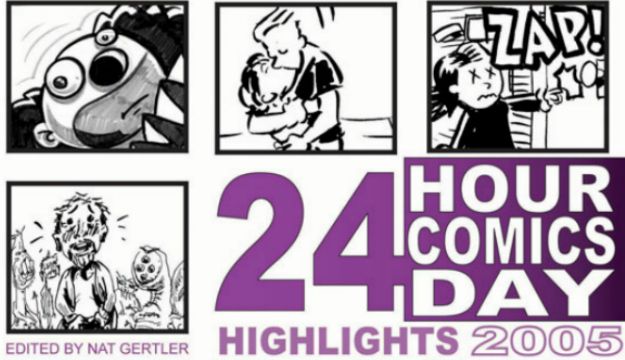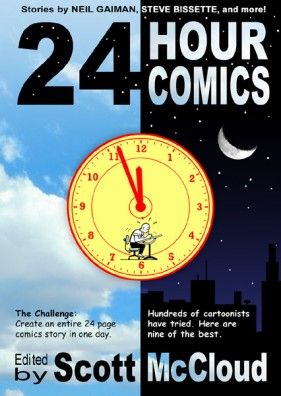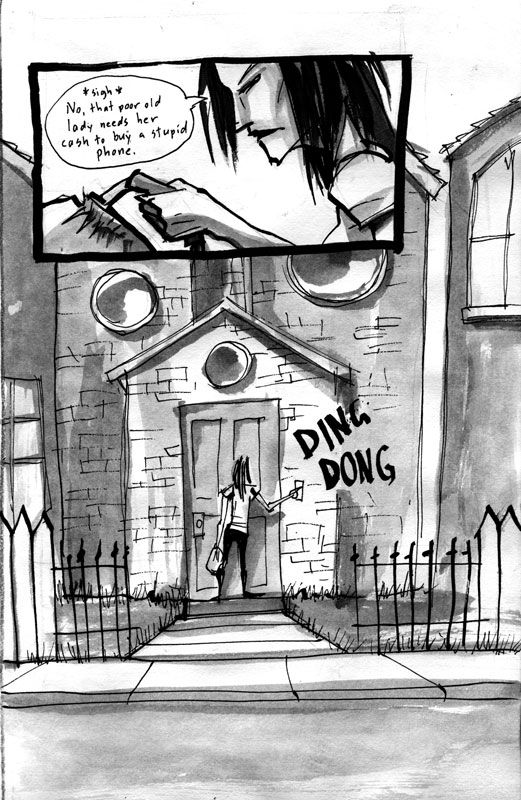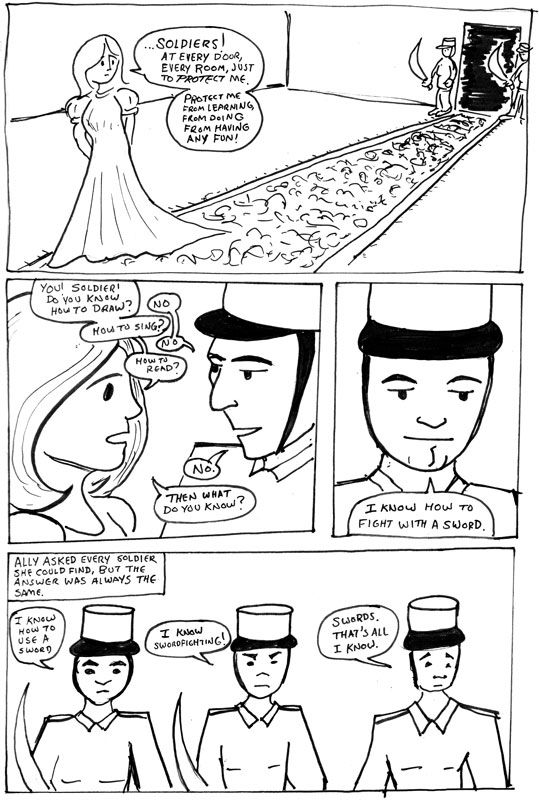Thursday marks 10 years since the first 24 Hour Comics Day. In recognition of this milestone, Nat Gertler, who organized that first day and orchestrated the event annually through 2007, was more than happy to share his recollections of its formation. One detail that surprised was that the 2005 collection features the first sold story by award-winning artist Fiona Staples.
In addition, Gertler briefly chats about his work on Kaboom's Peanuts series, as well as his publisher search for Tess Fowler's Jenny's City.
Tim O'Shea: What prompted you to organize that first 24 Hour Comics Day?
Nat Gertler: It was really a case of trying to organize something small and watching it snowball. I was publishing the book 24 Hour Comics, which collected some stories selected by the originator of the 24 hour comics challenge, Scott McCloud. For years, people had been going up to Scott saying, "Someone should publish a book of these!" but I was the guy who went up to him and said, "I want to publish a book of these," and even though my company About Comics is as small as they come -- it's a one-man operation -- Scott was up for it.
So now I had a book that would sell if I could get it publicized. Publicity ... never my strong suit, I admit. But I reckoned if I could set up an event somewhere with a handful of folks working on making 24 hour comics -- that means each trying to make a full 24-page comic book in 24 hours -- side by side, I could probably get some articles in the comics news sources of the day. There's a comics retailer discussion board run by a guy named Robert Scott who has a shop called Comickaze in San Diego. So I go on the board and ask if any store would like to host such an event, hoping to get a reply or two ... and within a day, I had about a dozen. I sure didn't want to say "no" to anyone, but there was no way that I was going to fly all over the country helping run a series of events, that degree of travel wasn't in the budget. But if made a big holiday out of it? By having the events all on the same day, then no one would expect me to come run them! So I picked a date (the 24ness of 4/24/2004 was undeniable), and did what I could to support the stores from the comfort of my living room.
Had you intended to produce the 24 Hour Comics Day Highlights 2004 book from the outset, or did you decide to do it after seeing the results?
Oh, that came before the event, definitely. When I realized how big the day was going to be -- and that first year was far smaller than the later years would be -- I saw a chance to put out an interesting book, and would probably have the backing of at least the involved retailers. So it seemed a good idea from both an artistic and business standpoint. In the interest of getting the book out as soon after the event as possible, though, I actually solicited it before the event, which meant that the solicitation couldn't include the names of the cartoonists whose work was selected for the volume.
What impressions still stick with you 10 years later from that first event?
I got to a visit a few of the event sites during the event, heading in during the wee hours, and I was amazed at the sheer joy of the participants. I had done a 24-hour comic myself -- felt I had to before I could ask Scott to let me publish the book -- and let me tell you, at 2 or 3 a.m., things seemed pretty bleak. And it wasn't just me, if you read 24 -our comics done before the first 24 Hour Comics Day, they tend to get pretty bleak, as tired people working alone face the strong chance that they would fail in what they trying, and realizing how much work still lay ahead. But when you have a bunch of people taking that same challenge side by side, there is a shared energy, a party atmosphere going on, and overall the comics done at these events tend to be much more upbeat than those done by folks working alone. Perhaps its a shared insanity, but really, that joy was striking.
Are there creator names that were unknown back in 2004 that became known partially because of participating in that first 24 Hour Comics Day?
I wish I could say that it was a quick route to fame, but no. Certainly, folks got some good reaction to some of the 24-hour comics that were in the book or posted on the Internet, but I don't think in the first year I can show it being a tipping point for anyone.
There's a little more of an argument for the second year, 2005. There was one artist who took part, and I selected her story for the 24 Hour Comics Day Highlights book that year. It was the first story she sold anywhere. She used that credit when pitching a series she was drawing to a small publisher. Did that credit help? I can't say for sure, but the pitch succeeded, and that series led to other things, bigger things. Now she draws a book for Image. It's called Saga. It's won big awards, sells a ton of copies, and by the way, it's pretty danged good.
Can you talk about the other books of 24-hour comics you produced?
Even when I first reached out to McCloud for that first book, I had my eye on doing more. From a sheerly business aspect, a success that you can replicate is far more valuable than a one-off, and there was a large base of 24 hour comics to choose from, even before the days. So I did the Highlights books, and I did 24 Hour Comics All-Stars, a book of stories just by comics pros (if loosely defined.) Of these, the 24 Hour Comics Day Highlights for 2005 was probably the most notable. Not only did it have the first published Fiona Staples, it had the first print publication for Faith Erin Hicks who now has quite a strong graphic novel career. It missed by a week or two having the first published Svetlana Chmakova, who also had a nice career ... but obviously, she was already going strong without that. And it had Kevin Cannon's first tale of Army Shanks, leading to his Eisner-nominated series of graphic novels. And lots of other good stories, of course, from a mix of pros, aspiring amateurs, and outsiders, with really varied ages and backgrounds.
But even though the books got some respect (including an Eisner Award nod), well, there were more people interested in getting into these books than interested in buying them. That was bad economically, of course -- all of the Highlights books lost money, and they were a heck of a lot of work to put together, reading through the hundreds of submitted stories, which really meant hundreds of times saying "no," and that gets emotionally wearying, But it was also bad for the event; people took to seeing 24 Hour Comics Day as a contest to get selected for the book. My goal was never to be pitting artist against artist; a 24-hour comic should be an artist against the clock, an artist against all the things that he thinks he's not capable of. Finishing the comic, or learning from not finishing it, those are winning. Seeing publication in the book as the prize ... well, that was a far weaker prize. Believe me, even if you get a story selected for the book, you'd have earned a lot more working a few hours flipping burgers than the selectees earned for their 24 hours of effort. I only did Highlight books for the first three years, but years later some people still thought the Day was a contest to get into the book.
What events led you to decide to no longer organize 24 Hour Comics Day?
There were a few reasons behind that decision. Probably the biggest was feeling that, as huge as it had gotten in the first few years, it had the chance to get much bigger. I have my strengths, but definitely in the realm of promotion, I have my weaknesses. If I could find someone to take it over who had at least a different set of weaknesses, they might be able to push it further than I could.
And besides, passing it along to ComicsPRO -- that's an organization for comics retailers -- freed me up in a couple ways. Of course, I saved myself the time I was spending publicizing the event, answering questions, maintaining the website listing all the event locations, tallying up the number of participants involved and pages generated (which is huge, when you think of it; when you have more than a thousand cartoonists, even if not everyone finishes you're still talking a number of pages in the five figures ... it's certainly more than, say, the entire run of Cerebus; I think we're at more these days than an entire year's worth of all the DC Universe comics). But it also freed me up on 24 Hour Comics Day itself. I had been the one guy who could not participate, because I was manning the phone doing what admittedly little I could do to make sure that everything went smoothly. And because of the staggered start times in various locations and the wide range of time zone the event took place in, I was actually in that mode for several days running each year. But having handed it off, I finally got to participate in the event, and did it for three years running. That was me finally reaping the fruit of what I had sown.
You still have an affinity for the 24 Hour Comics concept, given that you released a book of them in 2012. What is it about the concept that still holds your interest?
I sometimes told people that you'd know that I was done publishing 24-hour comics if I ever put any of mine in a book -- and that's what 96 is, a book of my four 24-hour comics. And that's really me using print-on-demand publishing to clear those stories out. If stories are your children, then really you care about them, worry about them, until they're published -- being published is for stories what getting a job and their own apartment is for your kid. I don't expect to sell many copies -- I'm pretty proud of a couple of stories, but I am a writer by nature and nobody is going to mistake me for a professional artist -- but they aren't just sitting their on my hard disk wanting me to find them a home. They are out in the world.
I still love 24-hour comics as a concept and an exercise. It is, in an intense package, both an education and a freeing experience. You learn what you are capable of; the pressure of that 24 hour deadline gets you to stop hemming and hawing and just put things down on the paper and move on. As a writer, I'm so used to staring at the screen, knowing very well what the next sentence I'm going to type is but still not putting it down; doing a 24-hour comic reminds you that's possible. But it's also a freeing experience, because the stakes are so low, because a 24 hour comic is not what you're building your career on. It's not dedicating two years of your life to a graphic novel that could be ruinous to you if it fails. You;re investing a mere day (plus some time catching up on sleep), and so you may as well try whatever you feel like. If things go well, at the end of those 24 hours you have a story in your hands that you're happy with ... and if not, you've only lost a day.
Besides, in our modern world, we have so little chance to focus on something. There is a great pleasure on just being able to work on something for all those consecutive hours, to have an excuse to set aside all the usual interruptions, to not have to multitask. I feel this especially strongly now that I'm a dad, when the days are filled with transportation, feeding, answering questions, and the general monitoring that one has to do with children on a typical day.
Creatively, what's on the horizon for you?
I do have some more stories coming up in the Peanuts comic book that Kaboom is publishing ... and folks who know my affinity for Schulz's work won't be surprised that there are other Peanutsy things afloat that I'm not ready to talk about yet. I'm waiting for just a couple more pages to come in from talented artist Tess Fowler before I start hunting for a publisher for Jenny's City, a fun, action-filled, kid-friendly series that deserves a bigger home than my own little About Comics line (which at this point is mainly focused on print-on-demand reprint books and ebooks.) I'm in the talking stage with a couple artists about crafting new projects together, have a few good things in the word processor as I figure out which gets priority, but there aren't a lot of definite things at this point. I often find that the Next Big Thing that pops up for me to do is a surprise opportunity. If anyone out there has that surprise opportunity for me, believe me, I'd be glad to hear about it!




